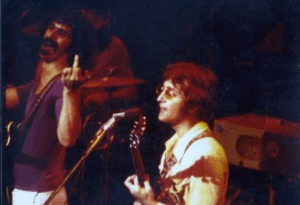How Brian Wilson’s Biggest Songwriting Gamble Became His Biggest Hit

Via USA TODAY / YouTube
When Pet Sounds hit shelves in 1966, the Beach Boys had already established themselves as kings of surf-pop. But “God Only Knows,” one of the album’s standout tracks, was something different. Lush, intricate, and deeply emotional, the song marked a bold step forward for Brian Wilson’s songwriting — and a moment of genuine risk.
At the center of the risk was the title itself. Wilson and co-writer Tony Asher feared that including the word “God” might doom the song’s chances on mainstream radio. At a time when lyrics were heavily scrutinized, especially for religious references, invoking “God” in a pop song wasn’t just uncommon — it was almost unheard of.
Despite the hesitation, “God Only Knows” would go on to become one of the most celebrated love songs in popular music. Its brilliance wasn’t just musical — it was emotional, vulnerable, and daring. The song’s journey from a potential liability to a timeless classic is a testament to the power of trusting your artistic instincts.
A Word That Almost Killed the Song
Brian Wilson and Tony Asher had major doubts when crafting the lyrics to “God Only Knows.” The word “God” in the title was the root of the concern. Wilson feared that radio stations would blacklist the track, assuming it was too overtly religious for pop audiences.
Asher recalled how serious the discussion was. According to him, unless you were singing something patriotic like “God Bless America,” there was simply no precedent for using “God” in a pop song. Wilson didn’t want to be the first. He was convinced it would hurt their airplay and visibility.
But Asher stood firm. He believed in the emotional depth of the song and knew that removing or changing the lyric would compromise its sincerity. He saw the song as something greater than just a pop track — a universal message about love and identity. Keeping the word “God” preserved that message.
View this post on Instagram
A Bold Opening Line That Nearly Got Cut
Apart from the title, the first line of “God Only Knows” — “I may not always love you” — also raised eyebrows. It was an unusually uncertain way to open a love song. Most tracks start with devotion; this one began with doubt. To many songwriters, that would seem like commercial suicide.
Tony Asher, however, saw genius in the contradiction. The line felt honest, vulnerable, and real. He pushed to keep it, even if it meant pushing back against Brian Wilson’s initial resistance. This wasn’t a love song built on clichés. It was built on a more complex, enduring kind of emotion.
Asher admitted he took a risk by insisting on the line, hoping it would pay off. In the end, he was right. The lyrics resolve into an unconditional promise, making the opening even more powerful in hindsight. That emotional arc helped the song resonate more deeply — and turned it into a classic.
View this post on Instagram
From Controversial to Canonized
Despite the worries during its creation, “God Only Knows” has since become one of the most revered songs in pop history. Musicians across genres cite it as an inspiration. Perhaps no one expressed its impact better than Paul McCartney, who has repeatedly called it one of the greatest songs ever written.
McCartney even admitted the song brings him to tears. Its raw, understated emotion struck a chord with him — and with countless others. In interviews, he has described performing it with Wilson as a deeply moving experience, one that left him overwhelmed during a sound check.
In a recent tribute following Wilson’s passing, McCartney wrote, “‘God Only Knows’ how we will continue without Brian.” It’s a fitting echo of the song’s legacy — a once-risky track that has outlived trends, transcended its doubts, and become the very anthem of lasting love.
View this post on Instagram











